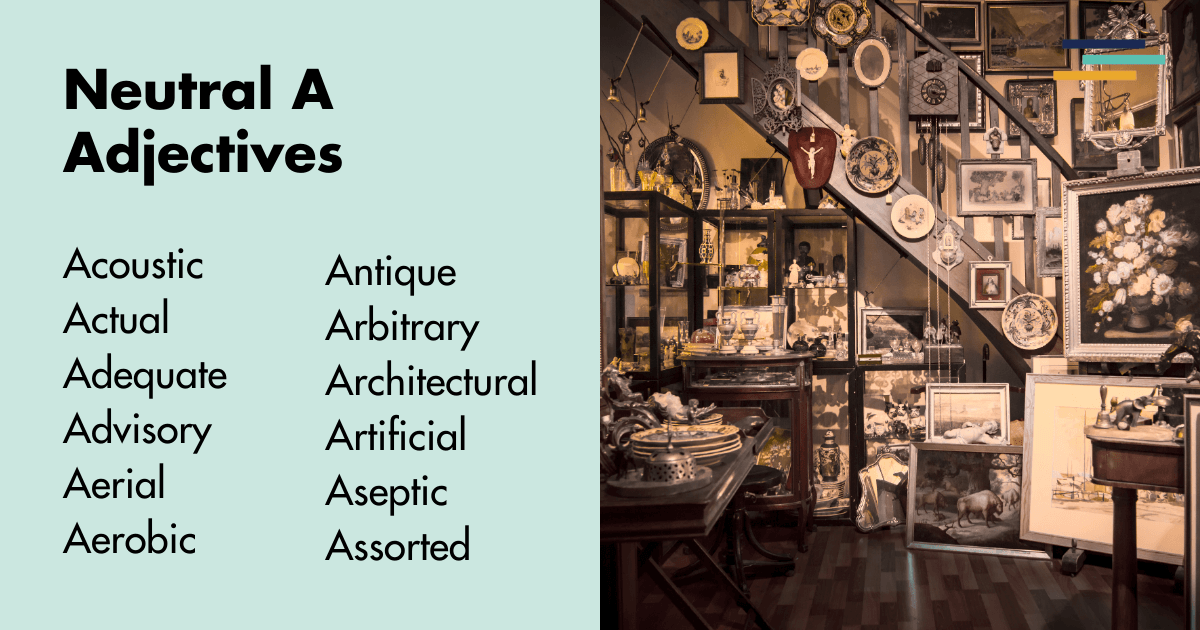
Choosing the perfect adjective to make your prose sing can be a real headache.
Whether you’re crafting relatable characters, setting the scene, or describing a particular event, selecting the right adjective can make readers sit up and take notice of your writing in the best possible way.
In this article, I break down 210 Adjectives That Start with A into easily digestible lists that are categorized so you know exactly when to use them. I’ve also rounded off with my Top ten tips on how to use adjectives in your fiction writing.
You can read the entire list now or pick the adjectives you need. That’s your choice.
Let’s dive in and discover the power of amazing adjectives beginning with the letter A.
Take a free trial of Fictionary today and take your story to the next level.
Positive A Adjectives
Here’s a list of positive adjectives starting with A you can use to describe all the lovely things about your characters:
- Able: Competent and talented
- Abundant: Plentiful and rich
- Accepting: Open and welcoming
- Accessible: Approachable and available
- Acclaimed: Praised and celebrated
- Accommodating: Helpful and cooperative
- Accountable: Responsible and reliable
- Accurate: Correct and precise
- Active: Energetic and lively
- Adaptable: Flexible and versatile
- Admirable: Respectable and commendable
- Adorable: Lovable and charming
- Adroit: Skillful and clever
- Adventurous: Daring and bold
- Aesthetic: Artistic and pleasing
- Affable: Friendly and good-natured
- Affectionate: Loving and caring
- Affluent: Wealthy and rich
- Agile: Nimble and quick
- Agreeable: Pleasant and cooperative
- Alert: Attentive and watchful
- Altruistic: Selfless and charitable
- Amazing: Astonishing and wonderful
- Ambitious: Driven and determined
- Amicable: Friendly and peaceable
- Ample: Sufficient and generous
- Amusing: Entertaining and funny
- Angelic: Pure and innocent
- Animated: Lively and spirited
- Appreciative: Grateful and thankful
- Articulate: Expressive and eloquent
- Artistic: Creative and imaginative
- Aspiring: Ambitious and hopeful
- Assertive: Confident and forceful
- Assiduous: Diligent and hardworking
- Assured: Confident and certain
- Astounding: Amazing and surprising
- Astute: Perceptive and shrewd
- Athletic: Fit and strong
- Attentive: Alert and observant
- Attractive: Appealing and charming
- Atypical: Unusual and uncommon
- Augmented: Increased and enhanced
- Auspicious: Favorable and promising
- Authentic: Genuine and real
- Aware: Conscious and informed
- Awesome: Impressive and awe-inspiring
- Awe-inspiring: Stunning and impressive
- Axiomatic: Self-evident and undeniable
- Avid: Enthusiastic and eager
These positive adjectives that start with A can be used to describe various positive attributes of characters, making them more vivid and engaging for your readers.

Negative Adjectives Starting with A
Here’s a list of negative adjectives starting with A that you can use to describe challenging aspects of your characters:
- Abhorrent: Disgusting and offensive
- Abominable: Loathsome and detestable
- Abject: Miserable and pitiful
- Abrasive: Harsh and rough
- Absent: Not present and inattentive
- Absurd: Ridiculous and nonsensical
- Abusive: Cruel and violent
- Abysmal: Terrible and dreadful
- Accidental: Unintentional and unexpected
- Accusatory: Blaming and critical
- Acerbic: Bitter and sharp
- Acidic: Sour and harsh
- Adamant: Stubborn and inflexible
- Addictive: Habit-forming and compulsive
- Adverse: Unfavorable and harmful
- Aggressive: Hostile and forceful
- Agitated: Disturbed and upset
- Ailing: Sick and unwell
- Aimless: Directionless and purposeless
- Alarmed: Frightened and worried
- Aloof: Distant and detached
- Ambiguous: Unclear and vague
- Amoral: Unethical and unscrupulous
- Amorphous: Shapeless and formless
- Anemic: Weak and listless
- Anguished: Distressed and tormented
- Annoyed: Irritated and bothered
- Antagonistic: Hostile and opposed
- Anxious: Nervous and worried
- Apathetic: Indifferent and uncaring
- Appalling: Shocking and dreadful
- Apprehensive: Fearful and anxious
- Arbitrary: Random and capricious
- Arrogant: Conceited and overbearing
- Ashen: Pale and ghostly
- Asinine: Foolish and stupid
- Asleep: Unconscious and dormant
- Asymmetrical: Uneven and unbalanced
- Atrocious: Horrible and appalling
- Attacking: Aggressive and assaulting
- Authoritarian: Dictatorial and oppressive
- Austere: Severe and strict
- Autocratic: Tyrannical and domineering
- Avaricious: Greedy and grasping
- Awful: Terrible and dreadful
- Awkward: Clumsy and uncomfortable
- Axiomatic: Self-evident and undeniable
These adjectives can add depth to your characters by highlighting their flaws and challenges, making them more dynamic and relatable.
Neutral Descriptive Words That Start with A
Here’s a list of neutral adjectives starting with A that you can use to describe various aspects of your characters in a non-biased way:
- Abstract: Conceptual and theoretical
- Academic: Scholarly and educational
- Accessible: Approachable and available
- Accurate: Correct and precise
- Acoustic: Sound-related and auditory
- Actual: Real and existing
- Adequate: Sufficient and acceptable
- Administrative: Managerial and organizational
- Advisory: Consulting and guiding
- Aerial: Airborne and overhead
- Aerobic: Oxygen-requiring and cardio
- Aesthetic: Artistic and pleasing
- Affine: Related and connected
- Affixed: Attached and secured
- Affective: Emotional and expressive
- Aggregate: Total and combined
- Agnate: Related and kin
- Agnostic: Skeptical and non-committal
- Alert: Attentive and watchful
- Alternate: Substitute and alternative
- Ample: Sufficient and adequate
- Annual: Yearly and once-a-year
- Antique: Old and ancient
- Apparent: Obvious and clear
- Applicable: Relevant and pertinent
- Appropriate: Suitable and fitting
- Arbitrary: Random and chance
- Architectural: Structural and design-related
- Articulate: Clear and expressive
- Artificial: Synthetic and man-made
- Aseptic: Sterile and clean
- Assorted: Various and mixed
- Atomic: Small and indivisible
- Attendant: Accompanying and attending
- Attractive: Appealing and pleasing
- Audible: Hearable and perceptible
- Authentic: Genuine and real
- Automatic: Self-operating and mechanized
- Autonomous: Independent and self-governing
- Available: Accessible and obtainable
- Average: Typical and standard
- Avid: Keen and eager
- Awake: Conscious and alert
- Awash: Flooded and covered
- Awkward: Clumsy and uncoordinated
- Axial: Central and pivotal
- Axiomatic: Self-evident and unquestionable
- Azure: Blue and sky-colored
These adjectives provide clear and neutral descriptions you can apply in various contexts to describe characters without imparting a strong positive or negative bias.

Professional Adjectives That Start with an A
Here’s a list of professional adjectives starting with A you can use to describe the professional behaviors of your characters:
- Abiding: Compliant and respectful
- Ablative: Protective and safeguarding
- Abstemious: Moderate and self-restrained
- Academic: Scholarly and educational
- Accomplished: Skilled and proficient
- Accountable: Responsible and reliable
- Accurate: Correct and precise
- Accumulative: Gathering and collecting
- Adept: Skilled and proficient
- Adherent: Loyal and supportive
- Administrative: Managerial and organizational
- Admirable: Respectable and commendable
- Adequate: Satisfactory and sufficient
- Adroit: Skillful and clever
- Advisory: Consulting and guiding
- Affable: Friendly and approachable
- Affirmative: Positive and supportive
- Agile: Nimble and quick
- Alacritous: Eager and enthusiastic
- Alert: Attentive and aware
- Altruist: Selfless and just
- Ambitious: Driven and determined
- Amicable: Friendly and cooperative
- Analytical: Logical and methodical
- Animated: Lively and spirited
- Anticipative: Foresighted and proactive
- Apologetic: Regretful and remorseful
- Appreciative: Grateful and thankful
- Approachable: Accessible and friendly
- Approving: Agreeing and supportive
- Apt: Suitable and appropriate
- Ardent: Passionate and enthusiastic
- Articulate: Clear and expressive
- Assertive: Confident and forceful
- Assiduous: Diligent and hardworking
- Astute: Perceptive and shrewd
- Attentive: Observant and mindful
- Attractive: Appealing and engaging
- Audacious: Bold and daring
- Authentic: Genuine and sincere
- Authoritative: Commanding and influential
- Autonomous: Independent and self-sufficient
- Avaricious: Greedy and covetous
- Avid: Enthusiastic and eager
- Aware: Conscious and informed
- Axiomatic: Self-evident and unquestionable
These professional adjectives will help you describe the professional behaviors and traits of your characters, adding depth and specificity to their roles in your narrative.

Funny Adjectives That Begin with A
Here’s a list of funny adjectives starting with A you can use to add humor to your descriptions:
- Absurd: Ridiculous and silly
- Acerbic: Sharp-tongued and biting
- Airheaded: Scatterbrained and foolish
- Amusing: Entertaining and funny
- Antsy: Restless and fidgety
- Archaic: Old-fashioned and outdated
- Asinine: Foolish and stupid
- Astounding: Surprising and amazing
- Awkward: Clumsy and ungainly
- Agog: Eager and excited
These adjectives, used in the right context, can enhance the humor in your writing by exaggerating traits and situations to create a comedic effect.
Tips for Using Adjectives Beginning with A
Tip 1: Be Specific
When using adjectives that start with A in your novel, it’s crucial that you make them specific. What we’re trying to do here is to avoid words that sound bland. Bland words are watery and do nothing to enhance your writing.
If you say a character is “smart,” that can mean so many things. Are they book smart or street smart? Who knows? If you say a character is “astute,” that’s much more specific.
Tip 2: Match Tone
Do the adjectives you’re using fit the tone of your novel and genre? If not, this is another place where you can use adjectives more effectively.
Say you’re writing a sweet, contemporary romance, then an adjective like “adorable” would fit well if used by a certain type of character. If you were writing a gothic horror, though? Not so much. Here, you might find words like “abhorrent” and “abominable” because of the darker themes and topics of the genre.
Match your tone to avoid confusing readers.
Tip 3: Use Sparingly
As with any literary technique or tool, the key is to use it sparingly. When you overuse a tool, it becomes repetitive, which causes readers to perform a huge, jaw-cracking yawn and put your book down.
I don’t want that. You don’t want that. Nobody wants that.
Use adjectives, particularly unusual or unfamiliar ones, sparingly to heighten the effect.
Tip 4: Consider Context
Always consider the context of the adjectives you’re using. The same adjective, used in different scenarios, can have vastly different meanings, both to your readers and to the other characters in your novels.
Take the word “ambitious,” for instance.
There are certain circumstances in which being ambitious is a positive attribute. If your character is a city trader, competitive athlete, or lawyer, and they’re ambitious at work, this is a good thing.
If, however, those same characters are ambitious in every area of their life (seeking to one-up and outperform friends and family in their personal life, for example) the word ambitious takes on a decidedly negative air.
Tip 5: Pair with Nouns
Pairing a strong adjective with a noun (a naming word) is a fantastic way to add more depth and meaning to your prose. You could say that something your character did was an achievement, but that doesn’t tell us anything about how the achievement makes that character feel.
If you said the win was an “amazing achievement,” we’d know the character felt good about it or even a little awed by it. If you told the reader it was an “aggressive achievement,” they’d know your character had to work hard, and perhaps do some things they weren’t comfortable with, to hit their goal.
Tip 6: Vary Your Adjectives
This comes back to using things sparingly to avoid repetition. Make sure you’re using a variety of adjectives in your work to keep things fresh and interesting for the reader.
Remember, we want to avoid those yawns and abandoned books.
Tip 7: Enhance Imagery
As we’re aiming to be specific, let’s not underestimate the importance of creating strong imagery. You could say that a character is “nice” and, while readers will know what that means, it doesn’t create a clear picture.
If you told readers the character was “angelic”, however, this creates an image of someone who never puts a foot wrong and is always polishing their spotless halo, a trait some other characters in your novel might admire, or find annoying.
Tip 8: Avoid Redundancy
Sometimes we use an adjective that doesn’t add any extra meaning to a sentence, and this is another way we inadvertently introduce repetition into our work.
Phrases like, “True fact,” and, “Completely finished,” are redundancies because facts are always true, and if you’ve finished something, then it’s complete by definition.
Tip 9: Maintain Consistency
Certain adjectives, like “angelic,” convey certain characteristics about a person. If, later on in your novel, you were to describe that same person as “devilish,” it wouldn’t ring true to their character.
This is one instance where readers might say people are acting out of character and that your characters don’t feel real.
Do yourself a favor and maintain consistency.
Tip 10: Show, Don’t Tell
Particularly with the emotion a character is feeling, use adjectives to show rather than tell. You could tell a reader a character is “angry,” but this is lazy writing. Instead, use a strong adjective to show something about the character’s personality.
You could say the character’s tone was “acerbic,” which demonstrates their anger but also conveys the harsh, biting tone of their words.
And finally, always remember that story comes first. Before worrying about the perfect adjective to use, it’s best to focus on:
- Creating engaging characters
- Penning an interesting plot
- Structuring solid settings
A tool like Fictionary helps you turn your draft into an interesting story readers love. So, with the right adjectives and a strong narrative foundation, your writing can truly shine.



